Radio Daze
Before the advent of WSUM, a tiny lakeshore station became a big part of campus culture
Trivia question: What was its name?
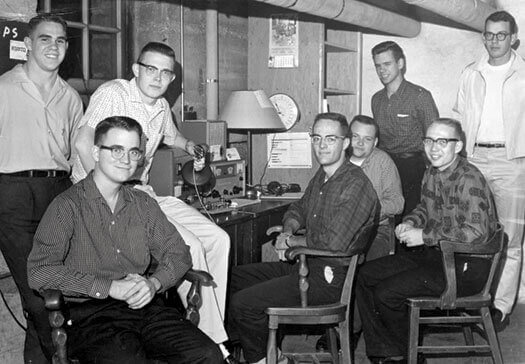
The original student radio station was started in one of the men’s residence halls in 1952 under the call letters WMHA, for Men’s Halls Association. Engineering major and classical music fan Charles Bartelt ’52 conceived of the idea because WHA radio went off the air every evening at sunset, and he wanted to continue listening to music after dark. UW–Madison Archives Collection Series 26/5, Box No. 645
On a Friday night in the spring of 1978, Ruth Elmendorf x’81 and her teammates took up residence at Adams Hall, ready for action. Elmendorf had agreed to participate in the campus radio station trivia marathon at the behest of a friend.
“We had a bank of eight to ten rotary phones,” Elmendorf recalls. “It was fast-paced, and it was nuts.” Everyone handling the phones continually dialed the number of the radio station, save for the last digit, to ring in quickest with the answer: a primitive version of speed dialing, Elmendorf jokes. “We also had scouts hanging out at the public library with a pocketful of dimes,” she says. With no cell phones, they had to find an answer, then rush to the pay phone.
Nobody slept during that weekend. “By Sunday morning, I was punch drunk and hallucinating,” Elmendorf says. “But when you’re nineteen years old, who cares. … It was so much fun.”
The popular trivia competitions, hosted by the former campus radio station WLHA — Lakeshore 64 — were the signature contributions of their era. The festivities drew enough attention to merit coverage from the local NBC affiliate, WMTV. On one occasion, the competition became so fierce that students yanked phone lines from a utility room in an effort to thwart other teams. “The university had to tell us to stop the contest because it was getting out of hand,” says Kevin Ruppert ’77, who worked at the station.
In many ways, the WLHA era of the 1960s and ’70s represents the golden age of campus radio. Before tuning in gave way to logging in, the ability to broadcast — to communicate with others who weren’t nearby — had an element of magic.
“People could listen to events going on in other places. … In our day, it was a big deal,” says Kevin Peckham x’75, who served as a DJ. “It was still considered a little exotic.” There weren’t as many ways then to listen to your new favorite song. If you wanted to listen to a particular album, “you’d have to go to the record store or have it mail-ordered,” Ruppert says. “Having the radio station play it for you had a special feeling.”
Landline Radio
The tiny station was started in 1952 by the Men’s Halls Association. It adopted the call letters WMHA, which morphed into WLHA when women moved into Slichter Hall in 1960. WLHA had a limited reach — for the most part, it could only be heard in the Lakeshore dormitories. Reception reached a mere three hundred to four hundred feet outside the residence halls, and the signal operated by carrier current: that is, instead of broadcasting over an antenna into the air, the signal traveled through the power lines of the residence halls.
“The equipment we worked with was very primitive,” says Lee Harris x’79, a WLHA alumnus from the mid-’70s. “We might as well [say that] we were running around in the Flintstone-mobile.”
Not only was the equipment primitive, but the students involved in WLHA also had to configure it. For some, that was a defining part of the experience. Asked to recall the highlights of his time there, Tom Mueller ’66 flashes back to a moment when he was “riding on the back of a motorcycle [while] carrying a large tape recorder, microphone, and cables.” He doesn’t remember whom he was going to interview, but the novelty of assembling and transporting all the relevant tools has stayed with him.
“Building the equipment and making it work — that was a big part of the fun,” says Evan Richards ’65, MS’70, who managed WLHA in the early ’60s.
There was only one problem: WLHA did not have a license to operate from the Federal Communications Commission (FCC).
“Sometimes we would succumb to the temptation to set those power levels a little higher than we should have so people got better reception,” Richards recalls. “If the FCC came around, we probably would have gotten in trouble.”
Live from the Lakeshore
While the trivia contests were the most popular events that WLHA hosted, the station experimented with a wide variety of programming. “The record library was impressive,” says Tim Brickner ’79. Ruppert recalls that the students used that vast music collection to experiment more than radio does today. “We played everything,” he says. “Bluegrass, pop, even some country music, jazz fusion. … We were one of the first radio stations to play Bruce Springsteen.”
New music came by snail mail. “In those days, record companies would send new releases,” Richards says. He recalls receiving the very first Beatles album from EMI and telling others that they wouldn’t amount to much. “There were some people who knew who they were — at that point, I did not.”
The station also held all-night sock-hops, covered university athletics, and even branched into radio dramas. The 1970s bore witness to The French Fry That Would Not Die, a theatrical production Peckham described as “a gruesome terror-thriller about an animated, talking French fry that escaped from residence hall kitchens” and “grew to be monstrously large and murderous, ravaging the lakeshore-dorms area, devouring students.”
Along with the fun that had some staff laughing so hard they cried, WLHA also covered serious issues. In 1973, when current Madison Mayor Paul Soglin ’66, JD’72 was the scrappy new kid on the block challenging incumbent Bill Dyke LLB’60, he gave an interview to WLHA.
When a Michigan politician who served as President John F. Kennedy’s assistant secretary of state for African affairs, G. Mennen Williams, happened to visit campus, Richards made sure to interview him. Richards also recalls staffing WLHA the day that Kennedy was assassinated.
“I was in class when Kennedy was shot,” Richards says. He went down to WLHA, announced to the listeners that the station would be shutting off, and put on the funeral march movement from Beethoven’s third symphony before he closed up shop.
Fading Out
By the end of the 1970s, WLHA, which was still broadcasting carrier current on 640 AM, was losing a lot of listeners to FM. Up until the late ’70s, nearly everything played on AM. “FM was around, but only the snobs listened to it,” says Bill Zabel ’66, noting that the “teeny boppers” preferred AM. But on FM, the sound quality was better, and as big stereos came to the dorm rooms, loyalty shifted.
The station continued losing steam in the ’80s. By the time Stephen Thompson ’94 became music director in 1991, he says that the station was a ghost town with only a “couple of guys trying to keep it alive.” Nevertheless, WLHA carried on until June 1993. By that time, it was operating at a low power on the FM dial. Thompson was the one who picked up the phone when the FCC called to put an end to the station’s tenure on air. Prompted by a complaint about interference with someone else’s signal, the FCC shut it down for operating without a license. It would take the better part of a decade for another radio station, WSUM 91.7 FM, to launch at the UW.
Thompson, who went on to become the editor of The A.V. Club for The Onion and is now an editor at NPR Music, stayed involved with the station after graduating. After years of struggling to get support from the school and jumping through the hurdles to obtain a license from the FCC, WSUM broadcast its first show in February 2002. Much of the credit, Thompson says, belongs to Dave Black MA’03, the station’s faculty adviser, who fought relentlessly to make it happen.
School of Radio
The WLHA of the ’60s and ’70s, however, yielded a number of successful radio personalities, including Tim Brickner, Lee Harris, and Jonathan Whirry Little x’64.
After graduating, Brickner stayed in town working part time for WIBA AM, eventually moving to a morning “infotainment” spot at WTDY AM. He spent the bulk of his career in radio, from 1987 to 2002, at Magic 98 FM. There he hosted the afternoon drive show, sometimes interviewing high-profile entertainers such as George Carlin and Aaron Neville.
For Harris, a morning anchor at the New York CBS affiliate, 1010 WINS, campus radio was fun, but it was also a steppingstone to a career in the industry. Before landing in New York in 1993, he was a co-owner and manager of a small station in Poynette, Wisconsin. In 2000, Harris was named best newscaster in the New York Achievement in Radio Awards.
“My radio career opened for me because I had experience at WLHA,” says Jonathan Little, who was so eager to break into the profession that he transferred from UW-Madison to UW-Stevens Point for a job opportunity at WSPT. Eventually, he returned
to Madison, where he worked for many years at WISM AM before leaving for a gig at Z104. His work has earned numerous awards, including his 2008 induction into the Wisconsin Broadcasters Association Hall of Fame.
Others, such as Peckham and Ruppert, went into the engineering side of radio. Ruppert is currently engineering supervisor at WISC-TV in Madison. Peckham is product manager at Full Compass Systems in Madison, where he oversees content for a professional audio-visual industry catalogue. Most WLHA alumni did not move on to careers in the industry, but they remain bound by the shared love of campus radio and the community it created.
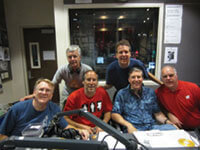
WLHA alumni attended a reunion weekend broadcast in July 2013, when they re-created a show from the ’70s using old jingles, promotions, and music. Among them were: (back row) Kevin Ruppert and Chris Kammer and (front row) Andy Arns, Tom Baer, Kevin Peckham, and Tim Brickner. Chali Pittman,
That ’70s Show
It’s that spirit of community, and the ongoing friendships it fostered, that have led many WLHA alumni to stay in touch throughout the years. In fact, a number of former staffers gathered in Madison for a weekend in July 2013 to stage an on-air reunion on WSUM.
The old gang collaborated on a whopping fifty-six hours of programming airing all day and all night. Ruppert and Peckham — known as “the Kevins” — put in the yeoman’s work, devoting hundreds of hours to pull it all together. They attempted to run the station as if they had never left, playing the old jingles, promotions, and contests. Alumni flew in from the Atlantic and Pacific coasts and in between.
“We started getting calls from people who had listened to WLHA in the ’70s,” Ruppert says. “We were very pleased that people did call in.” By re-creating the station from their college days, everyone had a chance to relive the experience.
“I didn’t hear anybody talk about what they did for a living,” Peckham says. “They were having the same conversation that they would have had forty years ago” — talking about their favorite music and what they planned to play on their shows. They played tunes from the ’70s (and a few from the ’80s), and it was as if, Ruppert says, they were still a team ready to do radio again, as if no time had elapsed.
The WLHA team impressed WSUM staffers with both their sense of camaraderie and the quality of their programming.
“The most interesting thing I witnessed that weekend was how much of a community WLHA was,” says Kelsey Brannan x’14, the program director of WSUM. Even during its heyday, WLHA was a fraction of the size of WSUM. “I don’t think it would be as easy for all of us to get together,” says Brannan, who coordinates a lineup of approximately two hundred DJs. Ruppert and Peckham say they are still in touch with about seventy-five WLHA alumni.
“The guys from WLHA seemed to have a little bit more ownership over their creativity and broadcast,” Brannan says. In particular, she admired a show by “Spaceman Jack,” in which the DJ played ambient music and pretended to be broadcasting from space.
The Legacy Lives On
WLHA alumni and today’s WSUM staffers have mutual admiration. WSUM “does a killer sports show,” Peckham says. Harris calls the station “remarkable” for how vibrant it is in the changing landscape of radio.
Harris, who oversees a college radio station in New Jersey, says it can be an uphill battle recruiting students to get involved. And over the years, a number of colleges have sold their airwaves to commercial entities, he says, although they usually maintain an Internet presence.
Most people listening to WSUM do so over the Internet. But some tune in — the signal for “the Snake on the Lake” (a reference to a former commercial station known as “the Lake”) is 55,000 watts, nearly reaching the Wisconsin Dells.
Today, campus radio competes with a broad array of platforms and personal devices for listenership. It’s a different environment, Black says, but he doesn’t think the role of student radio has changed very much.That role, he says, is about creating a sense of community. That’s what makes a college station “thrive or die.” The commercial radio stations in the area have to compete for the most listeners, he says, but “we’re the anti-that.”
Eliza Krigman ’05 is a journalist based in Washington, D.C. Her work has appeared in publications including the New York Times, the Washington Post, and the Atlantic.
Published in the Spring 2014 issue
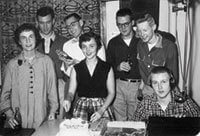
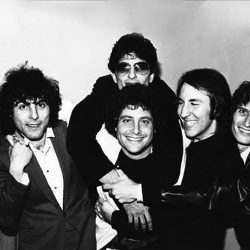

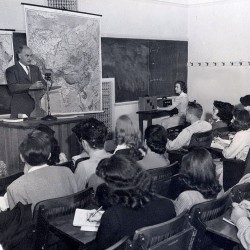
Comments
Nancy Eichelberger March 1, 2014
My time behind the mic at WLHA was so much fun and so creatively stimulating that I’ll never forget it. I still vow to someday have another show, perhaps on a public radio station. I went on to do radio and television writing and producing and a little voice-over work now and then. I’m still a communications geek. Those were the days, WLHA!
Elliot B March 3, 2014
Great read!
Doug Hamilton ('79) March 3, 2014
I just received my issue of On Wisconsin today and having graduated with a BA in Communications was looking forward to reading the “Radio Daze” article. It brought back a lot of great memories. But it only tells half the story. People forget that the Southeast dorms also had a radio station. I was one of the many program directors for WSRM 990 for 3 years 76-79 while at Madison. We operated out of the basement of Ogg Hall. We were no match for LHA but we tried. WSRM’s format was similar to WLHA in that each DJ’s turn at the board led to an eclectic mix of music. Each had their own following and it was divergent enough that we never really saw the popularity that WLHA had. I think we had a better softball team though !!
Like WLHA, WSRM was always on life support. Powered by an old army transmitter, tubes were always hard to come by. Clever DJ’s were always playing with the engineering students who kept it alive by ending the last shifts of the night by cutting off transmissions mid sentence. This was met with a flurry of calls to the station by the only person left listening at 3am (Engineer on staff).
It was a great experience that will never be forgotten. It was a time where students with a similar literally underground interest could gather and be heard.
Kudos to WLHA and their successes but WSRM was right there with you. @daytonadoug
Tom Macon '64 March 4, 2014
When I got my On Wisconsin, curiosity led me to the Radio Daze article and, to my surprise, found a picture of myself 55 years ago! I’m the guy in the middle.
This picture was taken sometime during the 1959/60 school year and is of several members of the Lakeshore Halls Radio Club, a ham radio station located in the basement of Adams Hall at that time. The ham radio club was not connected with WLHA, although a number of members were also active with WLHA. I’ve spun a few disks there myself.
The Lakeshore Halls Radio Club, callsign W9GOC, moved to Elm Drive Commons in the early sixties and faded away in later years.
There are lots of memories about amateur radio at UW in the early 1960’s, with both the W9GOC station at Lakeshore Halls and the Badger Amateur Radio Society (W9YT) on the engineering campus, which is alive and well today (http://w9yt.engr.wisc.edu/).
Mark Thompson March 15, 2014
Adding to Tom Macon’s comments there was also a third Amateur Radio station on the top of the East Tower of the original Ogg Hall from the mid-1960s to the mid-1980s.
Mark Thompson, 1980
David McCartney January 30, 2022
Eight years late here but nice article! I had a board shift at WLHA in spring semester 1977, and from there – thanks to a tip from Lee Harris – was hired as a student announcer at WHA / WERN. That same semester I produced a film story about the weekend trivia event for WMTV as a journalism class assignment. Campus radio is definitely about community and Lakeshore 64 in its day certainly met that need.
David McCartney, 1980